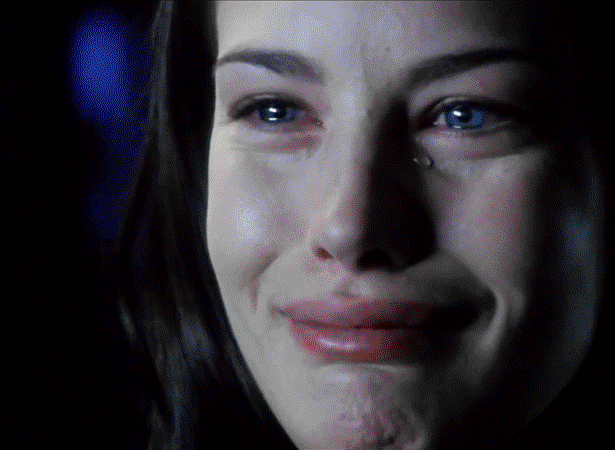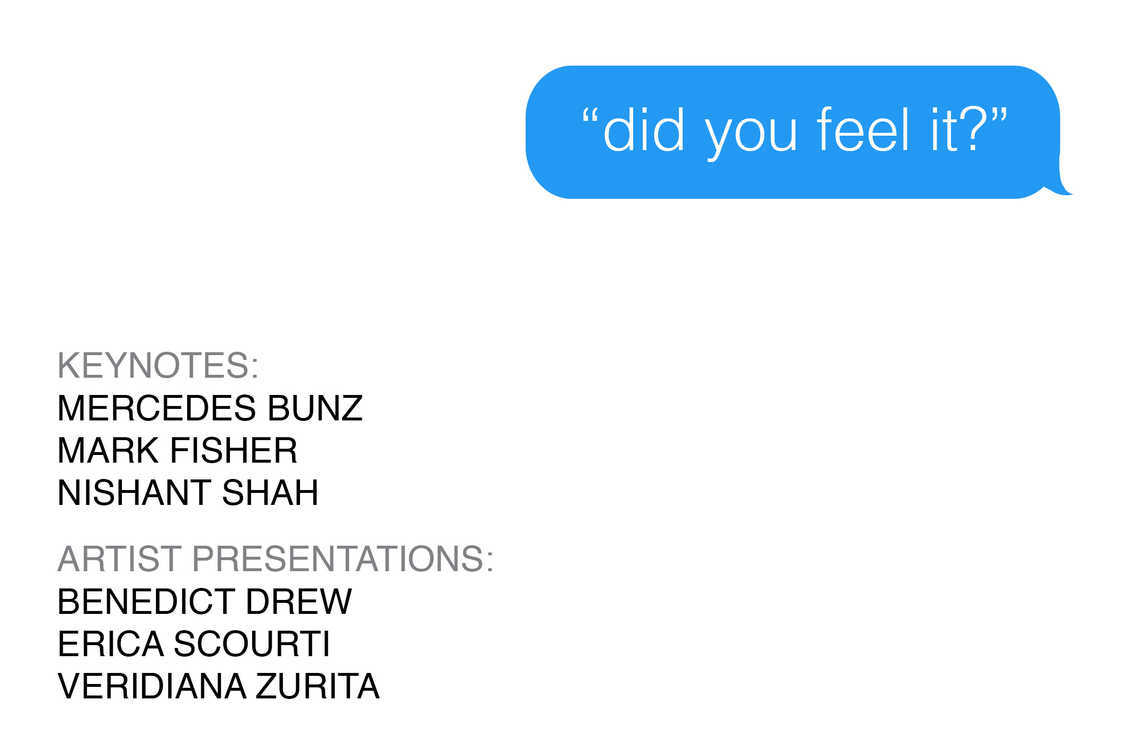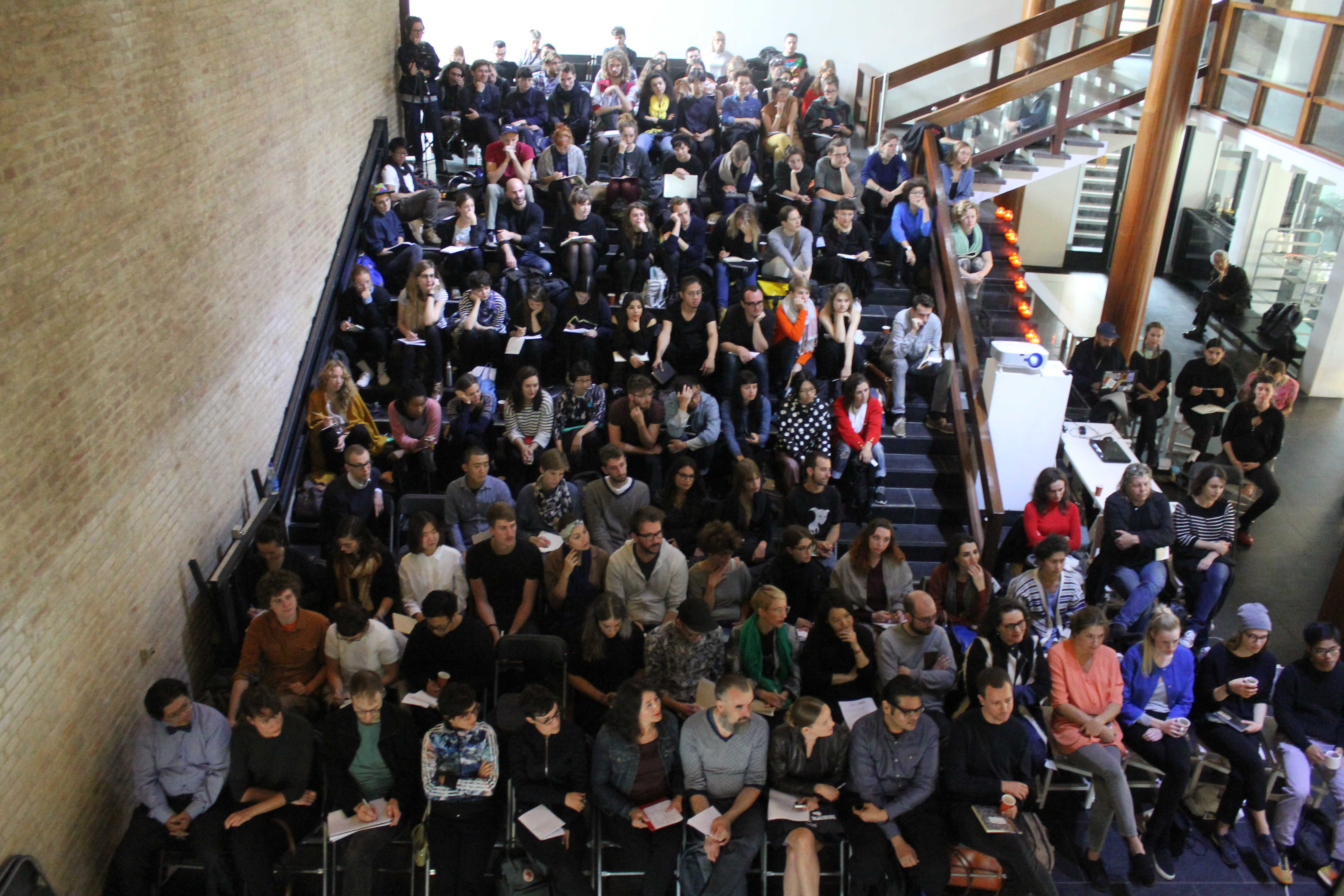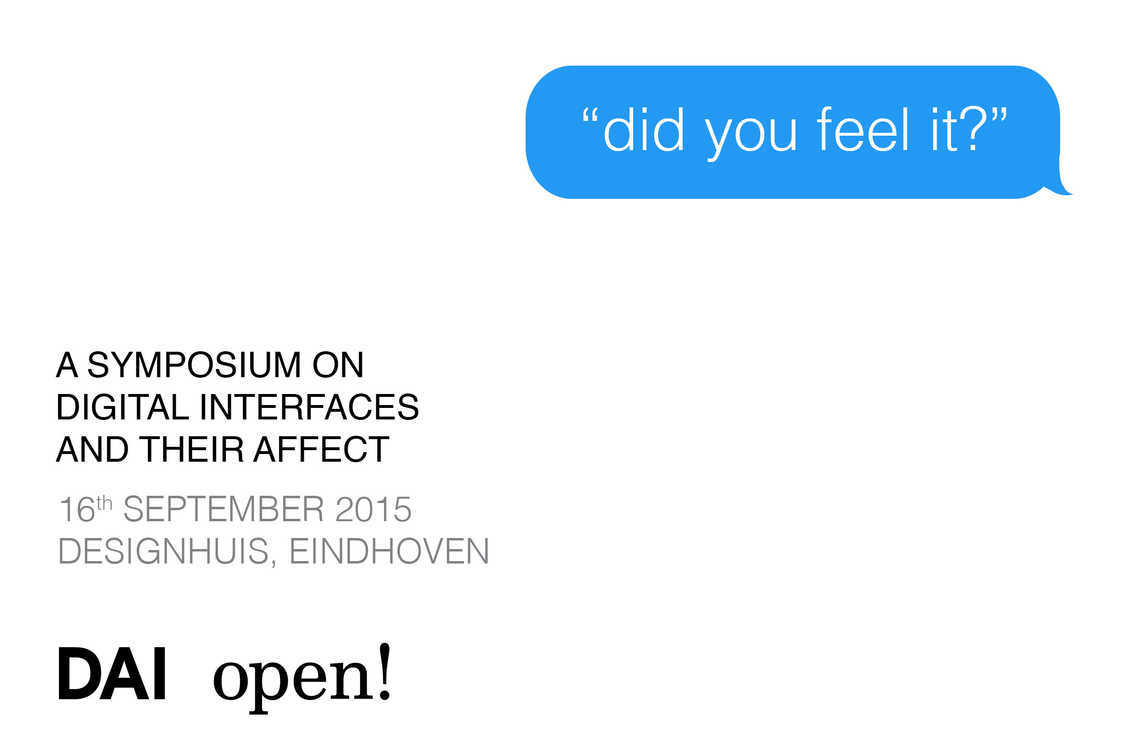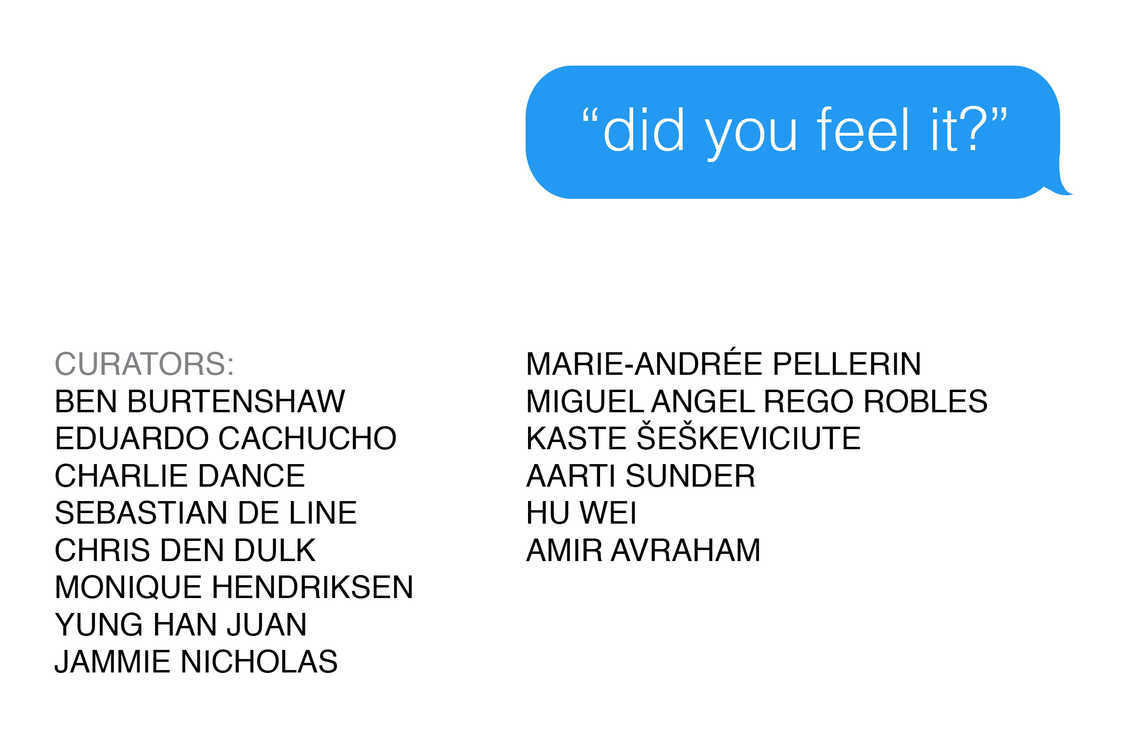2015 ~ September 16: ‘did you feel it?’ a symposium on digital interfaces and their affect curated and organized by DAI students and alumni in the context of an ongoing collaboration between DAI & Open! Talks & presentations by Mercedes Bunz, Mark Fisher, Erica Scourti, Nishant Shah and Veridiana Zurita
'did you feel it?' ~ a symposium on digital interfaces and their affect
Through lectures, artworks and performances we will attempt to understand how interfaces do shape, transform and transmit affect. In what ways does experiencing affect, mediated through an interface, work upon our daily lives ? And how can we as artists, designers and ‘users’ engage in the zone of aesthetic activity that the interface opens?
Program
Date: September 16, 2015
10:30 -11:00 Arrival; coffee and tea
11:00 - 11:15 Welcome by DAI director Gabriëlle Schleijpen; Introduction Ben Burtenshaw
11:15 - 12:00 Well, hello there!. Talking to technical interfaces, lecture Mercedes Bunz
12:00 - 12:15 Q & A with Mercedes Bunz and moderator Niels van Doorn
12:15 - 13:00 Artist presentation by Veridiana Zurita
13:00 - 14:00 Lunch prepared by vegan chef Mari Pitkanen
14:00 - 14:15 Jorinde Seijdel, editor-in-chief Open! launches student publications on Open!
14:15 - 15:00 The Object of our Affection: Pornography, Perversion, and Pleasure in the Digital, lecture Nishant Shah
15:00 - 15:15 Q & A with Nishant Shah and moderator Niels van Doorn
15:15 - 16:00 Artist presentation by Erica Scourti
16:00 - 16:15 Tea and coffee break
16:15 - 17:00 TELEPATHOS, lecture Mark Fisher
17:00 - 17:15 Q & A with Mark Fisher and moderator Niels van Doorn
17:15 - 17:30 Wrap up / conclusions with Niels van Doorn, speakers, artists and curators
17:30 Drinks
18:30 End
Practicalities
Entrance fee for non-DAI students: € 10 - to be paid upon entrance.
Your contribution entitles you, not only to mindblowing lectures and performances but furthermore to free coffee and tea as well as to a delicious and healthy communal lunch prepared by our chef.
Please note that reservations are conditional if you want to join the lunch: dutchartinstitute@artez.nl
Venue: Designhuis (at 1 minute walking distance from the Van Abbemuseum), Stadhuisplein 3, 5611 EM Eindhoven
Introduction:
The symposium "did you feel it ?" will approach the concern of how affect manifests through technology, by taking the idea of the interface as a way of understanding the creation and mediation of affective forces and their influence on our social, political and artistic encounters.
Affect can be defined as as “a pre-personal intensity corresponding to the passage from one experiential state of the body to another and implying an augmentation or diminution in that body's capacity to act.” (Brian Massumi) In our contemporary situation these experiential states and feelings are readily exchanged and traded upon in many areas of life: Your Facebook friends are editing and mediating their lives so that you can engage with them through liking and sharing. News media increasingly appeals to us on an affective register, influencing our reactions from occupation to commodification. With the growth of the service industry, an increasing number of workers no longer merely exchange the labour of their bodies, rather they exchange on an affective spectrum, like the call centre worker who must present a relentless kind and civil demeanor, no matter what.
What we do in the media is enabled and disabled by interfaces. The interface is the ubiquitous and largely hidden layer between human and machine, but its transparency does not make it neutral. It is also an autonomous zone of aesthetic activity, guided by its own logic and its own ends. (Alexander Galloway). The interface permanently shapes our view of the material, the social, the political and the technological.
Keynote lectures:
Nishant Shah: The object of our affection: Pornography, Perversion, and Pleasure in the digital
The trouble with love is, that it is very much like porn. We can’t see it, we can’t describe it, we can’t explain it, but when we feel it (or see it), we know it. I argue that the quantified logic of the digital, in its incapacity to deal with the affect of love, but in its ambitions to generate social intimacy and friendship, seeks out pathologies to be punished. With the emergence of the social web, there is a focused attention on perversion as an antithesis to love, leading to a gentrification of love that regulates industries of love as well as the love that shall not be named. Drawing from three incidents of regulation and control that show the inherent paradoxes of affection and affect in digital circuits of connectivity, I unpack for us, the idea of the digital as an object of affection, and how the tropes of pornography, perversion, and pleasure triangulate the new forms and protocols of feeling love.
Mercedes Bunz: Well, hello there! Talking to technical interfaces
We touch, swipe, type, pinch, tap, and sometimes speak to them: to use a technical interface is to communicate with technology. This lecture is curious what is happening with us, but also with technology, when we are having this conversation. To find out about this, the lecture will look sneak into those conversations we are having and study them from two different angles: 1) How is technology addressing us? Or in other words: what roles are on offer when we are being addressed, and what does art have to say to this? 2) What kind of place is it, where this conversation is happening? And as the interface has become a public stage, what does this mean for art?
Mark Fisher: TELEPATHOS
Mark Fisher will argue that the sharing of feelings will not be sufficient in and of itself to break down neoliberal subjectivity. Neoliberal capitalism has not only exploited our emotions, it has demanded that we identify as feeling subjects. This is partly because neoliberalism needed to contain the "molecular revolution" that countercultural consciousness-raising brought about between the 1960s and the early 1980s. While consciousness-raising began with people talking about their feelings, its transformative power depended upon groups coming to recognise the impersonal oppressive structures that generated those feelings. The success of neoliberalism depended upon those structures being once again occluded, with individuals corralled into assuming responsibility for their own happiness – and unhappiness. But this ideological disappearing act has started to fail, as the mechanisms by which neoliberalism has maintained a very restricted range of political possibilities have become increasingly visible. The conditions for new forms of consciousness-raising are now here, but they need to activated.
Artist contributions:
Erica Scourti will present a series of performances exploring gestures of user-device entanglement and shared intimacy with the affective interfaces of mobile computing. Parsing personal experience through productivity and self-betterment tools such as sentiment analysis, reminders and speed-reading apps, she performs the work of staying connected in always-on, networked life while pointing to what eludes quantification in a data-fixated era.
Veridiana Zurita: " In the work Life is Too Short I re-enacted a series of self-help videos on You-Tube. Between cure for depression and lifting exercises I dived into the mimicking process of words and gestures of those advising me. Departing from this work I will reflect on how the culture of self-help uses the idea of a heroic-self as an affective image and how the body becomes the very example of an interface for this process to happen".
Moderators:
Niels van Doorn & Ben Burtenshaw
Curated in the context of the year long course:
"did you feel it?" is the outcome of the 2014–15 Affective Images: How Public Images Produce Affect in a Digital Age , a common project between DAI, school for art, research, experiment, roaming, curating, performance, writing and publishing, and Open!, a platform for art, culture and the public domain.Advised by Open's editor-in-chief Jorinde Seijdel and artist researcher Florian Göttke the participating master students teamed up and inaugurated a curatorial collective responsible for the conceptual framework and the practical organization of the symposium.
Curatorial Collective:
Alumni DAI 2015 : Ben Burtenshaw, Eduardo Cachucho, Charlie Dance, Monique Hendriksen, Marie-Andrée Pellerin, Kaste Šeškeviciute, Aarti Sunder and Yung Han Juan.
Students DAI 2014-2016: Sebastian De Line, Katja den Dulk, Jammie Nicholas, Miguel Angel Rego Robles and Hu Wei
& Amir Avraham (alumnus Werkplaats Typografie).
Artworks:
The course participants will each launch a textual and/or visual essay revolving around "image-production and affect in the digital age," which are all published online by Open!
A collaboration between:
DAI and Open! wish to thank The Van Abbemuseum and the Designhuis in Eindhoven.

